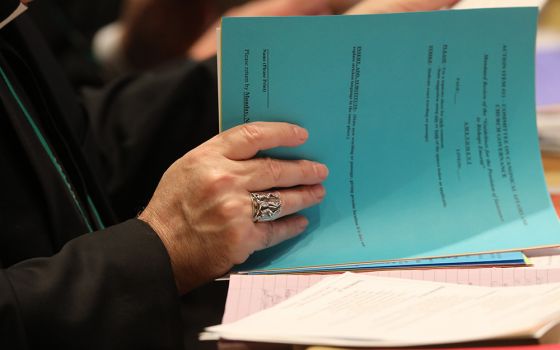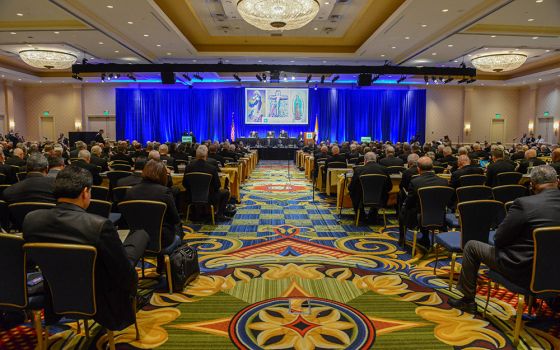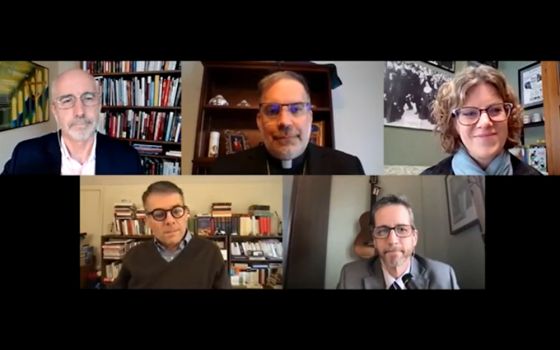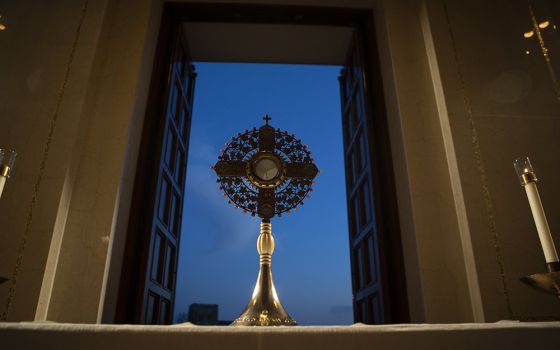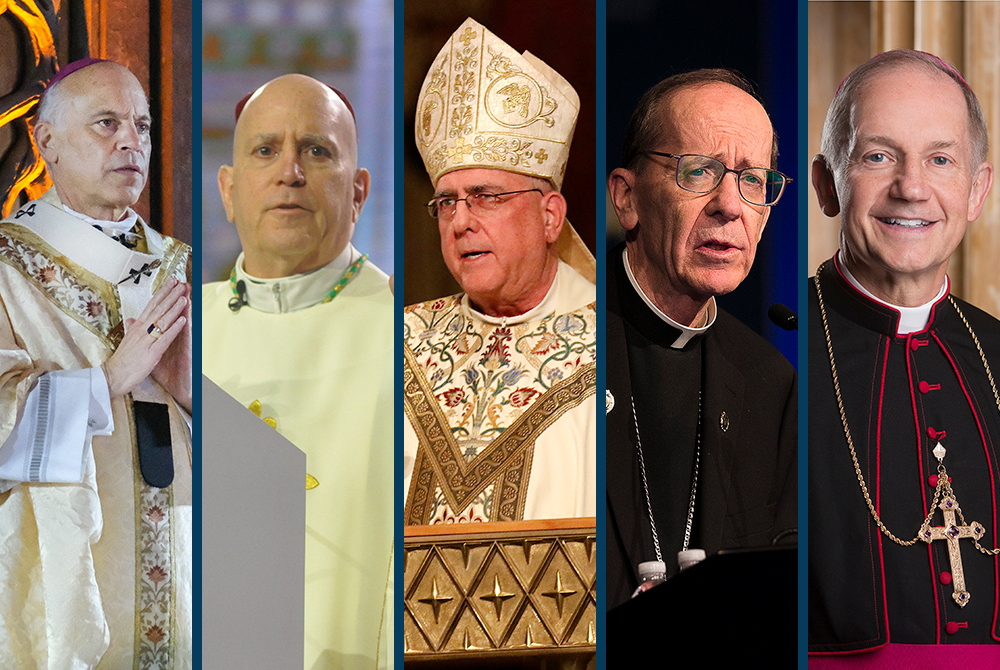
Archbishop Salvatore Cordileone of San Francisco; Archbishop Samuel Aquila of Denver Archbishop Joseph Naumann of Kansas City, Kansas; Bishop Thomas Olmsted of Phoenix; and Bishop Thomas Paprocki of Springfield, Illinois (CNS photos/Dennis Callahan, Archdiocese of San Francisco; Sean Gallagher, The Criterion; Gregory A. Shemitz; Tyler Orsburn; and Diocese of Springfield)
When Archbishop Carlo Maria Viganò, the disgraced former papal nuncio to the United States, released an unprecedented and soon discredited letter in 2018 alleging Pope Francis' complicity in covering up for former Cardinal Theodore McCarrick's history of abuse, San Francisco's Archbishop Salvatore Cordileone came to Viganò's defense.
Despite Viganò's shocking call for Pope Francis' resignation, Cordileone was joined by a number of U.S. bishops who bolstered the testimony of the former nuncio. Among them, Denver Archbishop Samuel Aquila, Archbishop Joseph Naumann of Kansas City, Kansas, Phoenix Bishop Thomas Olmsted and Bishop Thomas Paprocki of Springfield, Illinois, all of whom issued personal statements or gave interviews echoing Cordileone's praise of Viganò as a man of faith and integrity.
Today, those same bishops are also driving the controversial efforts aimed at pressing the U.S. bishops' conference to draft a document that will have far sweeping effects to deny Communion to Catholic politicians who support pro-choice legislation. When the U.S. bishops meet virtually June 16-18, they will vote on whether to proceed with drafting a document on the "meaning of the Eucharist in the life of the church," a proposal championed through a series of pastoral letters, media appearances, personal articles and social media campaigns by the aforementioned bishops.
Yet the manner in which the debate among the U.S. prelates has played out — and the medium in which the body of bishops will hold this debate — has come under scrutiny in recent weeks, including by longtime former staffers at the U.S. bishops' conference and high-ranking Vatican officials who see the rushed debate as a stark departure from Pope Francis' call for dialogue.
In May, Cardinal Luis Ladaria, the head of the Vatican's doctrinal office, sent a letter to Archbishop José Gomez of Los Angeles, president of the U.S. bishops' conference, urging caution and outlining the necessary process for moving forward with such a document, which included greater discussion among the bishops, Catholic politicians and other episcopal conferences.
In response, 67 bishops sent a private letter to Gomez, which was later leaked, requesting that the vote on whether to move forward with such a document be postponed until the bishops could meet together to discuss the proposal in person. Gomez has informed the body of bishops the vote will proceed without delay.
John Carr, who for a quarter of a century worked as the top policy advisor for the U.S. bishops, described the open display of divisions, both among themselves and with Rome, as "unprecedented."
"The idea that very direct warnings and guidance from the Vatican would simply be seen as an advisory opinion was not part of my experience," Carr told NCR. "The relentless campaigning for this proposal, the dismissal of other priorities, the leaking of correspondence, the impugning the motives of others is unprecedented in my experience."
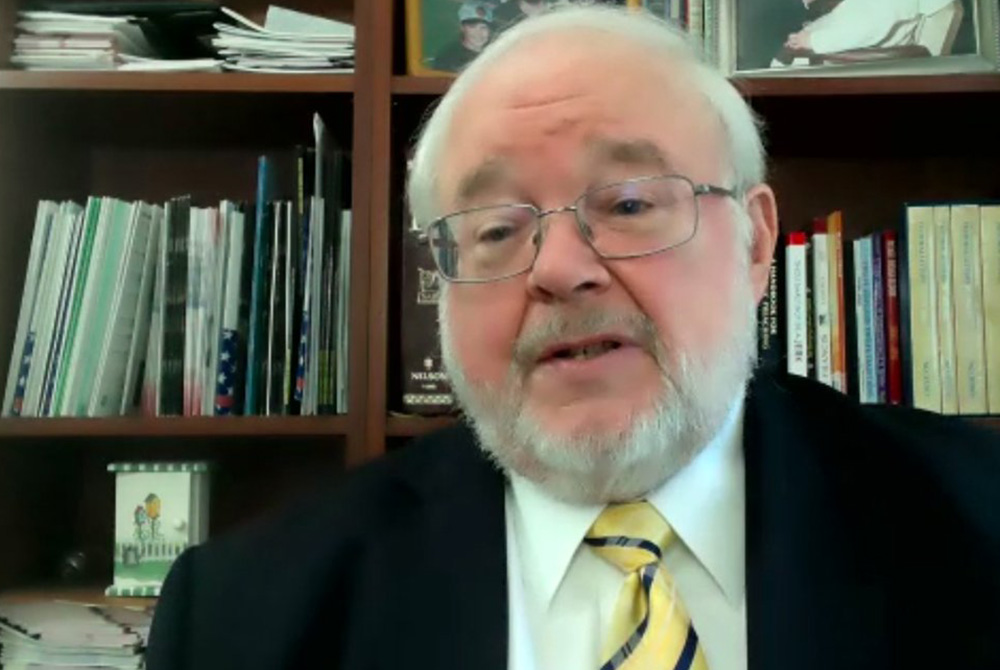
John Carr, co-director of the Initiative on Catholic Social Thought and Public Life at Georgetown University, participates in Georgetown's March 18 roundtable dialogue on "The Francis Factor at Eight Years: Global Impacts, U.S. Challenges." (CNS/Courtesy of Initiative on Catholic Social Thought and Public Life, Georgetown University)
Carr said Pope Francis has become "just one voice among many" and now "the question is not whether I agree with the pope but whether the pope agrees with me."
"The polarization in political life has found its way into ecclesial life that in a way, for too many of us, politics shapes our faith rather than our faith shaping our politics," Carr added. "The saddest thing is that the Eucharist has become a battleground instead of a source of unity."
Culture warrior bishops vs. Pope Francis
Many of the bishops now leading the push to deny pro-choice Catholic politicians Communion have been interconnected through a web of conservative Catholic organizations resistant towards Pope Francis and favorable to former President Donald Trump and the Republican Party.
One of the primary organizations behind the resistance effort is the Napa Institute, which regularly holds high-end conferences that provide a platform to some of the pope's most notorious critics. Attendees pay $2,600 in registration fees (plus hotel resort fees and travel expenses) to attend talks from high-ranking conservative bishops and priests, along with politicians such as Sens. Lindsey Graham and Rick Santorum, while attending wine and cigar receptions in Napa Valley.
One of the inspirations for the Napa Institute was now-retired Philadelphia Archbishop Charles Chaput, who served as its inaugural ecclesiastical adviser and who has been among the most vocal prelates against President Joe Biden.
Included on Napa's current ecclessiastical advisory board are Aquila, Cordileone, Gomez and Paprocki. Naumann is among those slated to take part in this summer's conference, along with Bishop Joseph Strickland of Tyler, Texas, who has repeatedly defied Pope Francis and the Vatican on the moral efficacy of the COVID-19 vaccines, endorsed a video claiming that one cannot be a faithful Catholic and a Democrat, and offered a prayer at the "Stop the Steal" rally in Washington last December, which falsely alleged widespread election fraud.
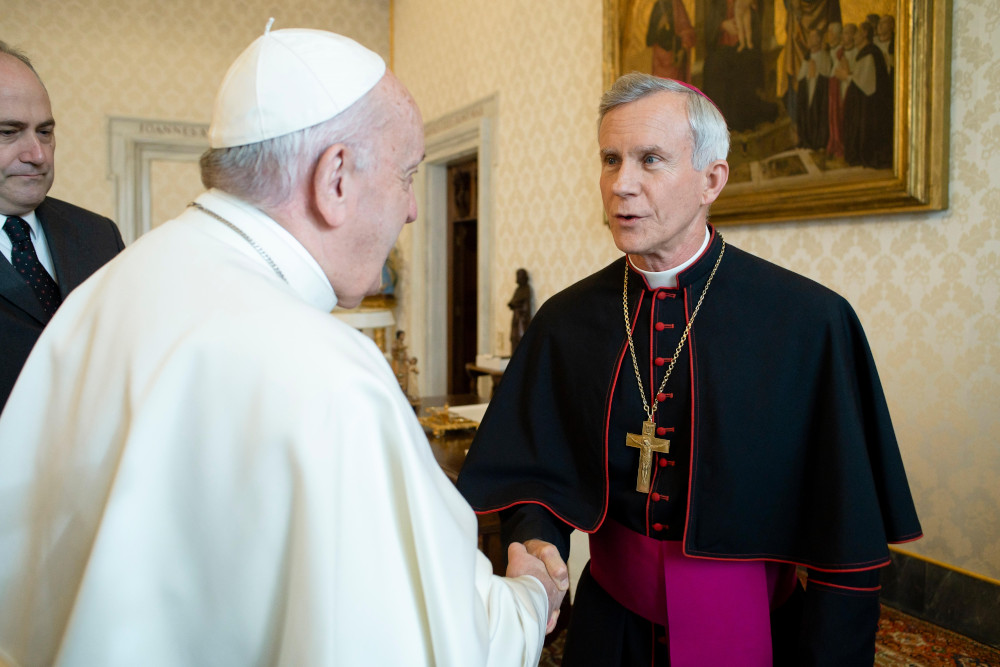
Pope Francis greets Bishop Joseph E. Strickland of Tyler, Texas, during a meeting with U.S. bishops from Arkansas, Oklahoma and Texas during their "ad limina" visits to the Vatican Jan. 20, 2020. Bishop Strickland said he asked Pope Francis about the Vatican investigation into Theodore E. McCarrick and the release of a promised report on how the former cardinal managed to rise through the church ranks. (CNS/Vatican Media)
In addition to their ties with Napa, the same prelates are among those who most regularly appear on the Eternal World Television Network (EWTN), which has come under scrutiny for its selective presentation of Catholic teaching. In recent years, the network's coverage has often been critical of Pope Francis and favorable to Trump and Viganò, who the network has continued to host, despite his calls for the pope's resignation and his backing of QAnon conspiracy theories. Chaput and Gomez are also both longtime board members to EWTN.
The National Catholic Prayer Breakfast, which annually brings together more than 1,000 Catholics to the nation's capital for a morning of prayer and speeches, has also served as a major platform for the same individuals and organizations and is backed financially, in part, by the Napa Institute.
In recent years, Chaput, Naumann and Olmsted have headlined the breakfast. The 2020 virtual event, broadcast live on EWTN, included an address by Trump and honored Attorney General William Barr with its "Christifideles Laici" award for service to the church, despite Barr having reinstated the federal death penalty, which has long been opposed by the U.S. bishops and is against church teaching.
Even so, Chaput took to the pages of First Things magazine and praised Barr for having "a thinking Catholic brain, a character of substance, and a moral spine." As an added bonus," Chaput wrote, "he's disliked by all the right people."
Soon after Biden's election as the nation's second Catholic president, Chaput took a different tone towards Catholic public officials who enact policies against church teaching. In another essay in First Things, he argued that Catholic politicians who support policies such as abortion and continue to receive Communion are causing "scandal" and that bishops who announce that they will give Biden Communion "do a serious disservice to their brother bishops and their people."
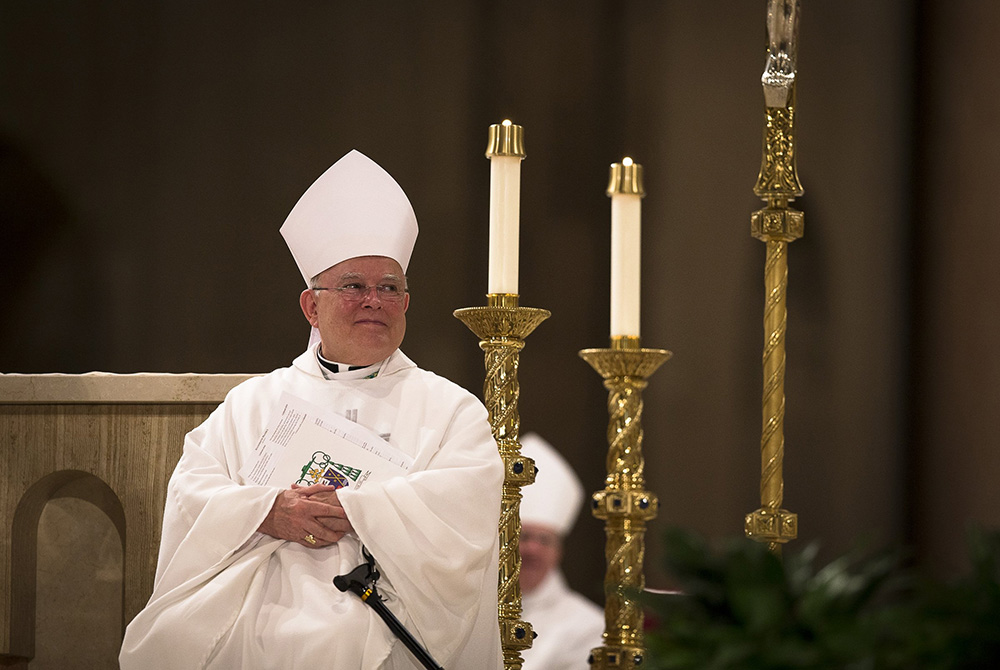
Now-retired Philadelphia Archbishop Charles Chaput is seen March 25, 2019, at the Basilica of the National Shrine of the Immaculate Conception in Washington. (CNS/Tyler Orsburn)
Chaput's essay came just days after Cardinal Wilton Gregory, the Archbishop of Washington, said he would not deny Biden Communion and looked forward to a relationship marked by respectful dialogue.
As a retired bishop and one lacking canonical authority in either Washington or Delaware where Biden most regularly attends Mass, Chaput's intervention into the Communion debate marked a departure from the 2004 document produced by the U.S. bishops' conference on "Catholics in Political Life," when the body of bishops first took up the topic of Communion for pro-choice Catholic politicians.
The document, which Chaput helped draft, said that the question of Communion should be left up to the local individual bishop. Carr recalls being a staffer working on the document and how, despite the sensitive nature of the issues at hand, "it united the conference and brought the bishops and the Vatican together."
"It accurately reflects the teaching of the church on the commitment to the unborn and the pastoral responsibility of bishops," Carr said, noting that it was passed with an overwhelming majority vote of 183 to 6. "It continues to serve the church well," he added, while warning that such consensus seeking efforts appear rare among the bishops today.
Stephen P. Millies, associate professor of public theology and director of the Bernardin Center at Catholic Theological Union, told NCR that the current cohort of Catholic bishops are principally shaped by the John Paul II and Benedict XVI era of the church, which emphasized a re-centralization of the church's authority and a desire to slow down change following the era of Vatican II. The Pope Francis era, observed Millies, is about a decentralization of power and making more room for voices on the margins.
Millies said what while many of the bishops leading a push for a document on "eucharistic coherence" are in some ways making a "very Francis" argument about decentralizing authority and not wanting Rome to "tell us what to do," while at the same time their impulse is not to approach the issue the same way Pope Francis would approach such a sensitive topic, with dialogue and broad consultation.
"This is where a lot of the disunity comes from," he noted, adding that many bishops still exert a central control and do so through the support of "well-funded movements" such as the Napa Institute, EWTN and the National Catholic Prayer Breakfast and are able to reach a larger audience through their networks and platforms.
"In all of these ways, there's a pipeline from the money to the creation of the message to the amplification of the message both through the institutional church and its structures, but also through those parallel organizations that support that vision of the institutional church or those people in the institutional church that are allied to them," Millies said.
Advertisement
'Extensive and serene dialogue'?
When Cardinal Ladaria, the head of the Vatican's Congregation for the Doctrine of the Faith, wrote to Gomez and the U.S. bishops in response to their plans for next week's planned vote on whether to proceed with a document on the Eucharist, he encouraged "extensive and serene dialogue" prior to advancing any potential plans.
Mercy Sr. Sharon Euart, a former associate general secretary of the U.S. bishops' conference, told NCR that "one of the fundamental questions that has yet to be answered is, 'Does the body of bishops want to act contrary to the directions from the Congregation for the Doctrine of the Faith?' "
"I think the focus of the letter from Cardinal Ladaria is on the unity of the conference," said Euart, who is now the executive director of the Resource Center for Religious Institutes. "In light of what has been reported, the question goes back to the action of the bishops: 'Will it promote that unity or will it obstruct it?' "
For his part, Carr believes that moving ahead would be "ecclesially divisive, pastorally destructive and counterproductive in public life."
He said that having this debate just over a year into the pandemic where many Catholics have been away from Mass for months — and at a time when many church leaders are trying to figure out ways to get Catholics back into the pews — sends the wrong message.
"This is a time to step back and ask what is the best way to encourage people to come back to the Eucharist? What is the best way to defend the humanity of the unborn child? What is the best way to share the wisdom of Catholic social teaching on immigration, poverty and life? What is the best way for us to care for our people at a time of racial reckoning?" said Carr. "If you've thought about that, no one would say, 'Let's have a fight about whether the Catholic president can go to Communion.' "
Euart doubts that, given the needed sensitivity of such discussions, that a virtual meeting would prove to be the right medium for such a significant policy move.
"I think we recognize that virtual meetings do not favor dialogue, especially with 300 persons," she said. "They tend to favor those who are comfortable speaking out, but lack the opportunity for back-and-forth dialogue. It can be a series of people offering opinions but not the interaction and dialogue that being in person can create."
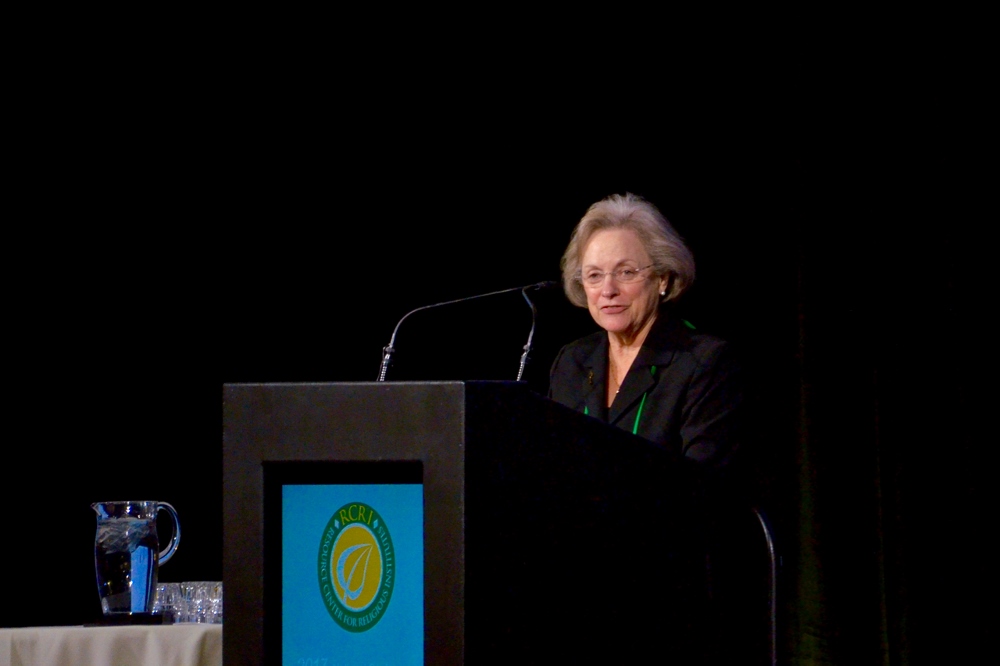
Mercy Sr. Sharon Euart, executive director of the Resource Center for Religious Institutes, welcomes attendees Oct. 31, 2017, to the Resource Center for Religious Institutes' National Conference in St. Louis. (GSR photo/Dan Stockman)
As a point of comparison, she noted that last summer, the Vatican's Congregation for Institutes of Consecrated Life and Societies of Apostolic Life said that religious could not hold a chapter virtually because they could not discern together. They could not take a canonical vote, because they could not ensure the necessary requirements.
"I think people are puzzled by 'what's the sense of urgency of a few months?' " she said.
Similarly, Carr labeled the rush to proceed ahead as "pastorally dangerous."
The current approach of the conference, he said, "generates and demonstrates the divisions between the bishops and Pope Francis and among Catholics."
Carr describes the contrast between these bishops and the pope as "an expression of two different kinds of leadership."
"If you think we have essentially lost the fight for the culture and that we're a faithful remnant, then you hunker down and try to preserve and protect what we have and you make statements, you proclaim truth, you make judgment and you issue penalties. That's one style of leadership."
"But," he continued. "If you think we have what the world needs, if you think Catholic social teaching offers a path forward, then you engage and persuade. You try to reach out and invite people in, and judgment and condemnation are counterproductive."
Quoting longtime PBS commentator Mark Shields, Carr said that you can measure the health of an organization by whether it is seeking converts or trying to find heretics.
"Pope Francis is looking for converts," he said. "Some others are looking for heretics and want to punish them."




